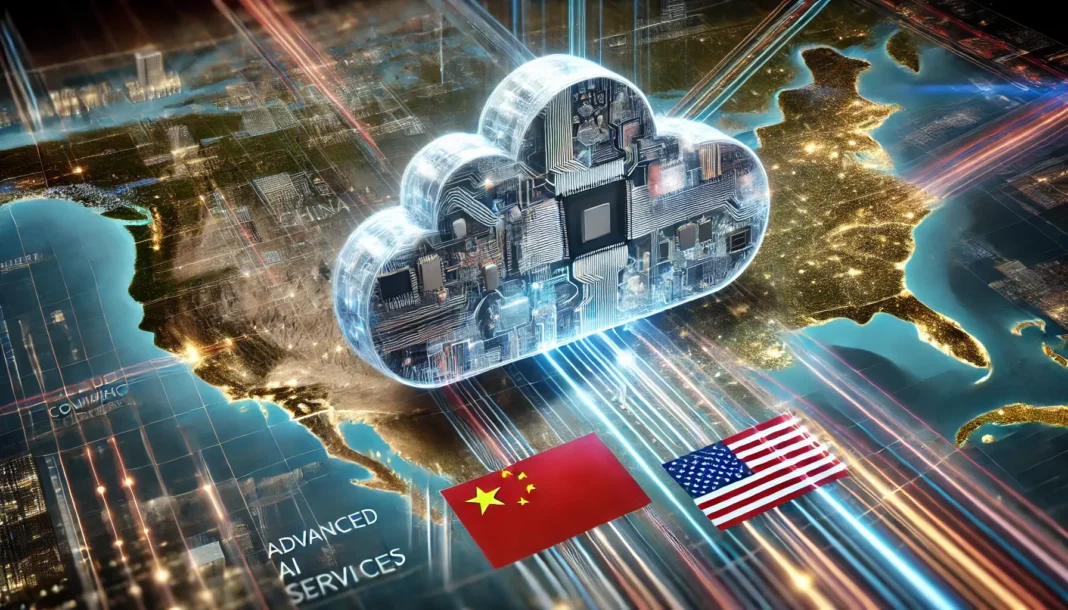Chinese firms are exploiting a significant loophole in US export restrictions to access advanced AI chips and models through cloud services provided by American companies like Amazon Web Services (AWS). This method allows them to circumvent direct sales bans, raising concerns about national security and the effectiveness of current regulations.
Over the past two years, the US government has implemented stricter controls on the export of high-performance AI chips from leading American companies such as Nvidia and AMD. These restrictions aim to limit China’s access to cutting-edge technologies that could enhance its military capabilities. Despite these efforts, Chinese firms have found a way around the regulations by utilizing cloud services that offer access to these banned AI chips and models, without directly violating US laws.
The Loophole in US Export Restrictions
US export regulations focus primarily on the direct transfer of physical commodities, software, or technology. As a result, accessing these AI chips and models through cloud services—where no physical exchange occurs—does not breach these laws. A recent investigation by Reuters revealed that at least 11 Chinese entities have used cloud services to obtain access to restricted US technologies. Among these entities, four specifically mentioned AWS as their cloud provider, accessing the services indirectly through Chinese intermediaries rather than directly from AWS.
These entities are leveraging cloud computing power to develop advanced AI models, circumventing the restrictions on direct chip sales. For example, Shenzhen University reportedly spent 200,000 yuan (approximately $28,000) through an intermediary to access AWS cloud servers powered by Nvidia A100 and H100 chips, which are otherwise banned for export to China. Similarly, Zhejiang Lab, a research institute, turned to AWS cloud services for AI model development due to the insufficient computing power offered by local providers.
US Lawmakers Raise Concerns
The discovery of this workaround has alarmed US lawmakers, who are now calling for tighter regulations to close this loophole. Michael McCaul, chair of the US House of Representatives Foreign Affairs Committee, emphasized the urgency of addressing the issue. “This loophole has been a concern of mine for years, and we are long overdue to address it,” McCaul told Reuters.
Pareekh Jain, CEO of Pareekh Consulting, echoed these concerns, noting that the current business model, where cloud services are sold through resellers or intermediaries, complicates efforts to restrict and monitor end users. As regulations on cloud services tighten, Jain predicts that more business will flow through resellers in China, shifting the compliance burden from providers like AWS to these intermediaries.
In response to these concerns, legislation was introduced in Congress in April to grant the US Commerce Department authority to regulate remote access to US technology. The department has also proposed new rules that would require cloud service providers to verify users of large AI models and report any potentially malicious activities to regulators.
AWS’s Position and Regulatory Challenges
AWS, as one of the primary cloud service providers involved, has stated that it complies with all applicable US laws, including trade laws governing the provision of services inside and outside of China. An AWS spokesperson noted that the company is aware of the Commerce Department’s consideration of new regulations and is prepared to comply with any future changes.
As Amazon continues to offer advanced AI chips and models, such as those developed by Anthropic, through its cloud services, it faces increasing scrutiny. The use of these cloud-based solutions by Chinese firms to bypass US export restrictions highlights the complexities of regulating advanced technologies in a globalized economy.
Following inquiries from Reuters, Amazon reportedly updated its Chinese-language posts to clarify the availability of certain services and removed some content to align with US regulations. However, the challenges of monitoring and enforcing these regulations remain significant, particularly as cloud computing becomes more integral to global technological advancements.
The Future of Cloud Services and Export Regulations
The ongoing debate over how to regulate cloud services and prevent the misuse of advanced technologies by foreign entities is likely to intensify. As Chinese firms continue to seek access to US AI chips and models through indirect means, the US government faces the difficult task of closing existing loopholes without stifling innovation or global collaboration.
For now, the ability of Chinese firms to bypass US export restrictions via cloud services underscores the need for a comprehensive review of current regulations. Ensuring that advanced technologies are not misused requires a nuanced approach that balances national security concerns with the realities of a connected, digital world.
Conclusion: Navigating the Complexities of Global Technology Regulation
As the technological landscape evolves, so too must the strategies for regulating the export and use of advanced technologies. The case of Chinese firms bypassing US AI chip export restrictions using AWS cloud services serves as a critical reminder of the challenges that lie ahead. It is essential for lawmakers, regulators, and technology providers to work together to develop solutions that protect national interests while fostering innovation and progress.
- Amazon Web Services (https://aws.amazon.com/)
- Nvidia A100 and H100 Chips (https://www.nvidia.com/a100-h100-chips)
- Reuters Report on US Export Restrictions (https://www.reuters.com/us-export-restrictions)











